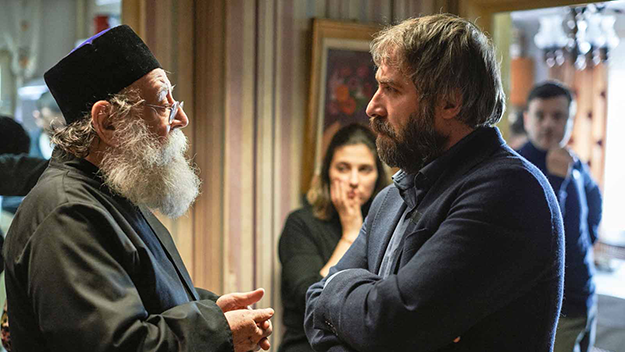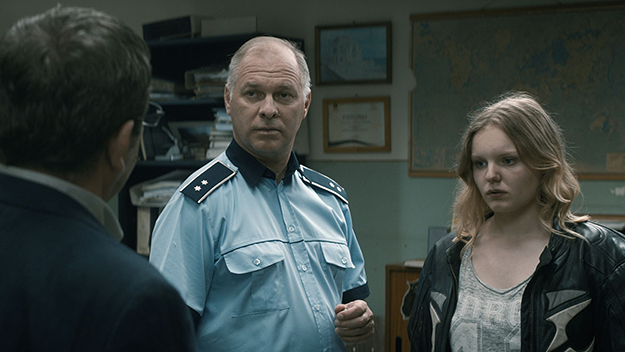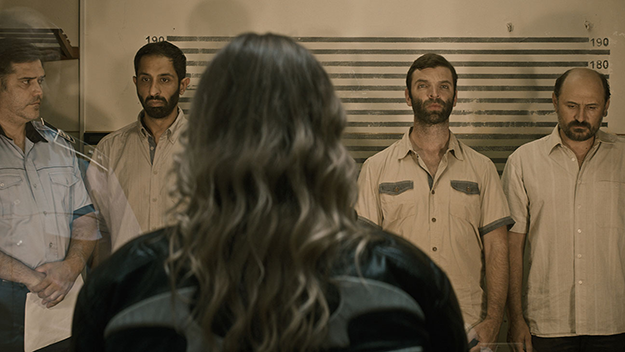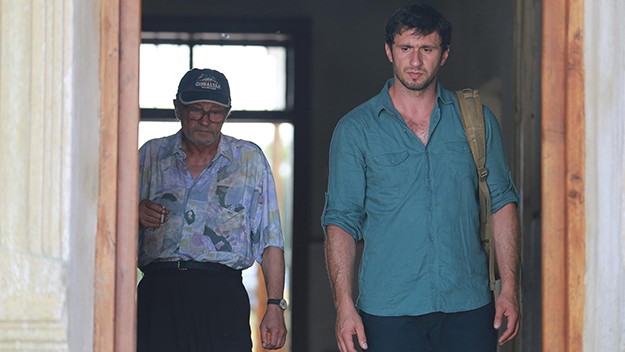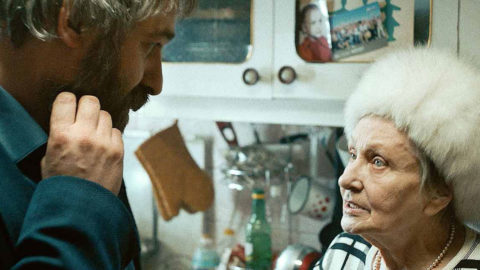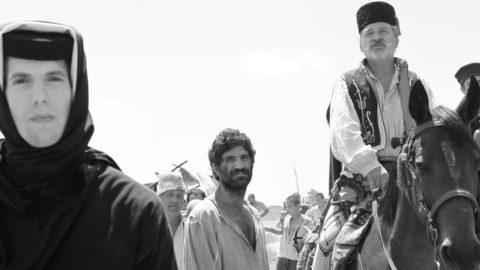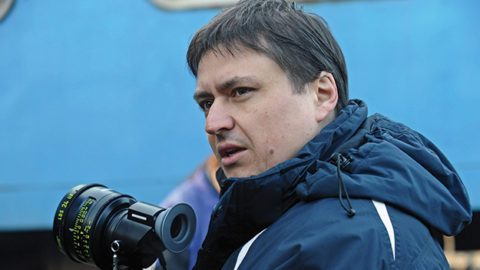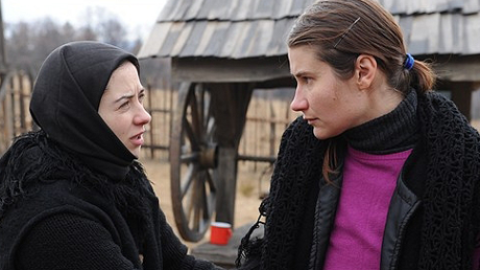Films of the Week: Romania Redux
Sieranevada
For the last few years, it’s been fairly easy to assume that we all knew what Romanian film was. In Cannes, the new national cinema made its decisive mark in 2005 with Cristi Puiu’s The Death of Mr. Lazarescu, followed two years later by the Palme d’Or win for Cristian Mungiu’s 4 Months, 3 Weeks, 2 Days. Both films established a particular mode of slow-burning, aesthetically austere, emotionally downbeat realism, and it’s been easy to assume that works by those directors, as well as Radu Muntean, Calin Peter Netzer, Radu Jude, Corneliu Poromboiu et al, were very much of a piece, especially since these filmmakers tended to downplay directorial flourishes of any sort that might overtly denote a strong personal signature.
Things are clearly beginning to change, however, and our perceptions with them. A decisive moment came in Berlin last year with the unveiling of Jude’s flamboyant, bustling historical drama in black and white, Aferim!, and they’re changing further in Cannes this year, with the premieres of three features in Official Selection.
Two of them are in Competition, both from known names, and judging by snatched conversations since this morning—Thursday—after the second was screened, critical sympathies are starkly divided between Puiu’s Sieranevada and Mungiu’s Graduation (Bacalaureat). Puiu’s film, screened at the start of the festival is without doubt the more formally adventurous of the two, an extraordinary sustained feat of choreography. It’s set largely in a single apartment comprising several rooms, in which a family attend a memorial or blessing service for their late father, with Tudor Vladimir Panduru’s camera floating or zigzagging drunkenly along corridors and between rooms, while a barely containable host of characters shuttle around in different combinations. The end titles include a credit for a “Making of,” which is quite mind-boggling—it’s hard to imagine that anyone could have fitted another camera into this cramped space, as busy with comings and goings as a railway terminal at rush hour. It’s a film I’ll no doubt come back to on its release. For now, I felt it was easier to engage with as a feat rather than as a piece of complex character drama—but it’s also one of the films of Cannes 2016 that I’d be happiest to see again.
Graduation
On a single viewing, I’m not sure whether Mungiu’s Graduation, press screened on Thursday morning, will carry the same rewards. Still, it’s a very compelling and troubling piece that satisfies as drama, yet also leaves enough loose ends and whispers of symbolic import to suggest that there’s a lot more going on than some of my more skeptical colleagues have suggested.
At first glance, Graduation is a somewhat by-the-book drama about moral compromise and the dangers of attempting to get ahead by doing “what everyone does.” The setting is the Transylvanian mountain town of Kluj, and the protagonist is Romeo Aldea (Adrian Titieni), a middle-aged hospital doctor whose teenage daughter, Eliza (Maria Dragus), is about to sit an important exam. On her success hinges the possibility of going to Cambridge on a scholarship—a notion that Romeo is absolutely committed to, believing that there’s no future for her either in Kluj or in Romania all told.
But just before her exam, a number of troubling incidents happen—a brick is thrown through the window of the family flat, then Eliza is attacked by a mystery assailant, breaking her concentration. There’s no way of her getting out of the exam, so Romeo strikes a deal with a local official in need of medical attention—a liver transplant in exchange for pulling strings that will get Eliza the desired result. Meanwhile, Romeo is experiencing a chill at home with his wife Magda (Lia Bugnar), while also having an affair, which carries its own complications, with a young teacher at Eliza’s school named Sandra (Malina Manovici).
Graduation
Graduation is what you might call a “raining stones” movie, in which terrible things happen to the characters, one after another. But since they’re of different natures, it’s hard to imagine that any one factor could be causing them all—except, in some veiled way, the hand of fate, or Romeo’s own guilt. But there is also a malevolent force targeting the family: whoever threw the brick, and later breaks Romeo’s windscreen. An image of the windscreen shattering, shot from inside the car, inevitably brings to mind parallels with another film about a distant ill-wisher observing a self-deceiver from afar: Michael Haneke’s Hidden. Just as that film’s Daniel Auteuil character kept hidden from himself his complicity in an episode of French political violence, Romeo—ostensibly the archetypal “good man”—is living in denial of his collusion with an endemic corrupt system. With the characteristic irony of stories about such themes, it’s the relatively good man who is made to experience his world falling apart, when the more profoundly corrupt survive, protected by the degree of their complicity with the status quo.
Mungiu could be accused of making the film’s argument about Romanian social disillusionment too overt: Romeo talks about his family returning from abroad after Romania’s 1989 revolution, thinking they could “move mountains” and finding themselves unable to change anything. But this intricate and quietly unpredictable film does contain a slowly crackling fuse of quiet apprehension and anxiety, and its 128 minutes—unlike some of the excessive running times we’ve seen at Cannes this year—never seems less than well-earned.
Graduation includes a cameo role from Vlad Ivanov, who since his turn as the baleful abortionist “Mr. Bebe” has been one of Romanian cinema’s more recognizable faces. He also appears to terrifying effect in a film in the Un Certain Regard sidebar—Dogs (Caîni), by first-time director Bogdan Mirica. More than one critic has tagged this as a Romanian version of No Country for Old Men—another film involving an old wise cop and an epidemic of sudden death. There’s certainly a strong, spare Coens streak to this low-key thriller, which has a touch of Western in its theme of territorial struggle. It’s about a man named Roman (Dragoș Bucur), who arrives in a remote rural district to take possession of the property that belonged to this late grandfather, “Uncle” Alecu, a violent gangster who ran some sort of shady, never quite defined, import-export racket.
Dogs
The inherited property comprises a ramshackle house and a vast tract of land on which nothing has ever been grown—the function of the land, for the grandfather, was simply to protect the business from prying eyes. Now, however, the old racketeer’s minions, headed by his smiling second-in-command, want to hold onto the land and prevent Roman from selling it. They’ll do anything to hold onto it—as suggested by the superb slow tracking shot that begins the film, ending in something nasty abruptly bobbing to the surface of a stagnant pond (talk about proudly symbolic).
That something proves to be a severed foot, still in its boot, which is contemplated coolly by local senior policeman Hogas (Gheorghe Visu), who—in a deliciously extended single shot—gives the foot the forensic once-over, on the same plate he’s just eaten his dinner off. There’s another astonishing shot later on, in which the menacingly smiling Ivanov character reveals exactly what he’s capable of. It’s a startling moment of violence that you can see coming, but you’re convinced that it won’t happen—because for someone to do something like that, in circumstances like this, they would have to be truly deranged. Suffice to say, Ivanov’s character is truly deranged.
The payoff in Dogs doesn’t remotely go where you’re expecting, either, in the same way that the Coens’ No Country for Old Men takes unexpected left turns in the final stretch. There’s also, I suspect, a nod to Straw Dogs in the title, and this film is just as unforgiving (not to say unapologetically sordid). In a Cannes that has given us a lot of pleasures, but very few real surprises or revelations, Mirica’s debut stands out, in a modest way, as both surprise and revelation—and certainly contributes to redrawing the map of Romanian cinema that we thought we knew so well.
Jonathan Romney is a contributing editor to FILM COMMENT and writes its Film of the Week column. He is a member of the London Film Critics Circle.



